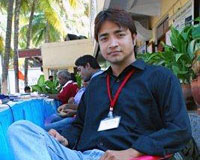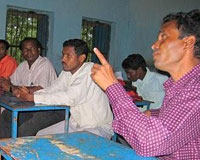Where politics and religion mix
by - 10th November 2009
 The election just completed in two states confirms the swing away from the fundamentalist and sectarian parties in India.
The election just completed in two states confirms the swing away from the fundamentalist and sectarian parties in India.
Maharashtra and Haryana have just voted Congress in sizeable numbers, further securing their lead gained in the major elections in April and May this year.
The Bharatiya Janata Party of the right wing Brahmin-led Rashtriya Swayamsevak Sangh [RSS] continues its downward slide.
There are credible reports appearing in the papers that will undermine the Hindu extremist groups still further. Bomb blasts at festival times to emulate Muslim attacks are an increasing tactic. It is even thought now that the audacious attack on Parliament in 2002 was a Muslim-disguised Hindu attack.
Militancy has failed the poor in India – and no amount of PR can restore a credibility that has no content. A makeover of the RSS Hitler style image is a poor substitute for justice. ‘Khaki goes chic’ was a Telegraph headline in India announcing a new dress code for party workers of trendy kurta and tight churidar pants wrinkled above the ankles. Gone is the bicycle as official transport, here comes a car as a perk for the family.
Other measures to revive the Party include setting up branches for working men and students, although the latter will not stand for elections against the established student union.
The Christian community is encouraged at the decline of the political force of the Hindutva and the rise of the non-sectarian Congress Party. Despite the common, anti-incumbent vote at General Elections, the top Congress trio of The Prime Minister Dr Manmohan Singh, Mrs Sonia Gandhi and her son Rahul, continue to command respect because of solid achievements.
Mrs Gandhi steers an unerring course as Chairman of the Party, guiding appointments towards clean cabinet ministers and women in high office. The President, Mrs Pratibha Patil, and Mrs Meira Kumar, the new Speaker of the Lok Sabha Parliament, are recent appointments, both firsts for women.
Dr Manmohan Singh has a quiet, gracious manner with an astute economics acumen and a rational view of economic growth juxtaposed with persistent poverty.
He has described the very high infant mortality as a cause of national shame. The four-year-old National Rural Employment Guarantee Programme is said to have won many votes of the rural poor.
Rahul Gandhi, the next generation in the dynasty, continues to turn down high office in Government, preferring to build the Party, especially other young leaders like himself. He gets close to the people with sincerity.
Such an incident took place in small town Bolangir, west Orissa, where this article is being written. Last April in the run-up to the Election, Rahul made an unannounced overnight stop here and stayed in the Public Works Dept Inspection Bungalow, not with the local political elites in the Maharajah’s palace.
He went into the bazaar and sat and talked to people in the evening, gathering quite a crowd which accompanied him with great goodwill back to the Bungalow.
At the same time as this see-saw of political fortunes, there is a new strong move by Protestants in the Evangelical Fellowship of India (EFI) to step into the political arena, to begin to engage seriously in what was perhaps viewed earlier as the playground of politics.
As Christians they have made major contributions in the development of the country, especially recognised in the fields of child care, education and health.
It is time, they feel, to translate the immense value of this social capital to influence governance and policy-making to create a more just and value-based society. It is time to tackle the cause of social ills, they say, not just the symptoms.
This is a new expression of the responsibilities of citizenship being grasped by Christians. There’s a move by the frog to come out of the well. A new realization has dawned following the pattern of social changes which have been driven by spiritual movements, such as the abolition of slavery and child labour in the UK and US, and the abolition of suttee – widow burning - in India.
 Engaging democratically in public policy is vital, EFI says, in addressing social change. So, at their recent All India Congress of the Church in Mission in Secunderabad [13 – 16 October], they launched the Christian Public Policy Centre.
Engaging democratically in public policy is vital, EFI says, in addressing social change. So, at their recent All India Congress of the Church in Mission in Secunderabad [13 – 16 October], they launched the Christian Public Policy Centre.
Couched in terms of a God-given direction to do justice, the new Centre will encourage thought and discussion among Christians of diverse traditions to promote a biblically balanced political agenda, to nurture dedicated involvement and to help churches to combine social action with ‘saving souls’.
To a large extent these two functions have been kept apart in the Christian community, despite the significant work in running reputable schools and hospitals with Christian foundations.
The Centre aims, too, to equip Christian leaders for civic responsibilities, to articulate and promote their political views and enable Christian citizens to work together with community leaders to shape policy and public life for the good of all.
It seeks to advance justice by advocating the proper exercise of government authority and to foster a just society.
The Centre will take action in democratic and peaceful ways, persevering with professionalism and prayer.
It will be an organisation of members with different forums of stakeholders such as bureaucrats, technocrats, academics, theologians and, not least, those few Christians – there are around 30 - that are already elected representatives in Parliament or State Assemblies.
There will be research, monitoring and reporting on policy and practice, campaigns on specific and strategic issues with the use of good communication media to make significant impact.
Workshops of Christian groups, youth, women, church leaders, will build political awareness, pool resources in articulating a Christian perspective and strengthen networks across denominations.
 In Secunderabad, a selected group shared papers which will find their way into a published Evangelical Framework for Political Engagement. Those at the Congress were urged to become members, to begin to see oppression, injustice and corruption as a holy God sees it and to learn, feed a passion, share it and pray.
In Secunderabad, a selected group shared papers which will find their way into a published Evangelical Framework for Political Engagement. Those at the Congress were urged to become members, to begin to see oppression, injustice and corruption as a holy God sees it and to learn, feed a passion, share it and pray.
With this move the church will be forced to set its own house in order in terms of social justice and the Church in Mission Congress took a step forward in one area: women’s equality of worth. Their role in pioneering new churches was recognised as never before.
Some well-respected Christian NGOs, foremost in specific areas of work, need still to respect the abilities of women. But the General Secretary of EFI, Revd Dr Richard Howell, is himself in the forefront of this social change.
A household of women may help, but he is grounded in theology enough to recognise God’s heart for women and their value. This nation needs all the person power at its command in order to break the barriers of ages that keep the poor people poor and the low castes ‘backward’.
Part of the battle for change must be about words. The Other Backward Castes are demeaned by their name as much as anything else. Christians from a scheduled caste Hindu background are re-classified as Other Backward Castes [OBCs] and lose their original privileges and benefits e.g. reserved school and college places and jobs.
They have been recognised by a Parliamentary Commission to merit maintaining their scheduled caste status, but the government is stalling the progress of the Commission Report from becoming positive action. As the number of OBCs is high in the Christian community at well over 50per cent, political engagement on this issue will make a significant impact in the development of this sector of society that has walked away from the oppression of Brahmin-dominated caste.
This would make a good issue for the new Christian Public Policy Centre to engage with, right through to a successful outcome.
However, it will not only seek justice for its own community but will seek justice for all, justice just as God requires.
In a recent interfaith meeting on social justice, Mr C.B. Samuel, Minister-at-large with the Emmanuel Hospital Association, said, ‘What we need is a God of justice and if we haven’t got one, we must make one.’ After the meeting, some Hindu colleagues approached Samuel and said, ‘You are right. We recognise that only the Judeo-Christian religions have a God who is concerned about injustice.’
This is a constant; no swing, see-saw or even roundabouts can alter this truth. The God of the Bible says, ‘I will see that right prevails’ [Isaiah 51:4].
Jesus visited the world to do this; to put the last first, to proclaim good news to the poor, to set the oppressed free, and to proclaim the year of Jubilee when debts were cancelled and property restored to poor families. ‘Today,’ he said, ‘this scripture is fulfilled.’ [Luke 4:21]
The time for justice is always now.
Read human rights lawyer Tehmina Arora on ‘Equality and Social Justice’
http://www.efionline.org/tehmina-arora/273-equality-and-social-justice
- Log in to post comments
